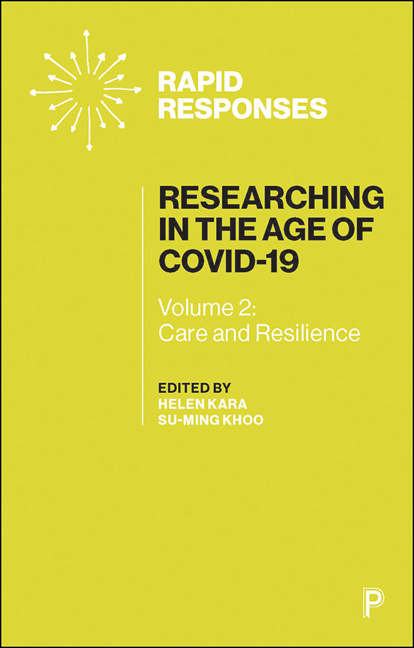10 - Occupational Being During the COVID-19 Pandemic
Published online by Cambridge University Press: 23 March 2021
Summary
The COVID-19 pandemic is having a severe and unprecedented impact on the health and wellbeing of people around the world. In a matter of weeks (and sometimes days), longestablished ways of doing, being, becoming and belonging have been forced to rapidly transform to adapt to new community standards. While similar disruptions have occurred previously in the context of local events (such as war or natural disaster), they have never occurred on a global scale before.
Our health and wellbeing is directly impacted upon by participation in the activities of daily living that bring meaning to our lives (Wilcock, 2006). This inter-relationship is the primary focus of the health profession of occupational therapy, which is a long-established part of health services around the world (World Federation of Occupational Therapists, 2012a). Occupations are the daily activities that people do, either individually or with others, to occupy their time and bring meaning or purpose to life (World Federation of Occupational Therapists, 2012b). The term ‘occupational being’ refers to an identity which emerges from interaction between the four dimensions of occupation – doing, being, becoming and belonging (Hitch and Pepin, 2020). Occupational beings may be individuals, groups or populations.
A study to follow the pandemic experiences of people living in Western Melbourne is currently underway in Australia. The aim of the mixed-methods study is to describe how community members experience occupational being over a six-month period, including changes over time. This chapter will reflect on the opportunities and challenges we have experienced while designing and performing research during the COVID-19 pandemic.
Managing uncertainty
There are known knowns; there are things we know we know. We also know there are known unknowns; that is to say we know there are some things we do not know. But there are also unknown unknowns – the ones we don't know we don't know. And if one looks throughout the history … it is the latter category that tend to be the difficult ones. (Rumsfeld, 2002)
All research during the COVID-19 pandemic is being conducted in a complex and rapidly evolving context, which has a lot of ‘unknown unknowns’. Our knowledge of the virus remains in its infancy, and there is significant variation in the way governments and health systems are supporting public health across jurisdictions.
- Type
- Chapter
- Information
- Researching in the Age of COVID-19Volume II: Care and Resilience, pp. 111 - 120Publisher: Bristol University PressPrint publication year: 2020



